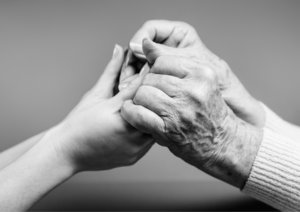In January 2003, my husband, Dainis, and I were just shy of our fifth wedding anniversary. We had been attempting to start our family biologically for over a year and had not yet achieved success. I had just transitioned my career from the airline industry to our church, hoping to slow life down, when I suffered a massive hemorrhagic stroke.
We learned that life can change in the blink of an eye, and our job is to learn to trust God’s ultimate plan, even if we have a different outcome in mind.
I was in the hospital recovering for two months, and two months after my hospital discharge, Dainis lost his job in the aviation industry. This was right after September 11th, and the industry had a great slowdown. We moved from Minnesota to Arizona for his career, and I found a wonderful new rehab facility. My recovery took off, and for the next eight years, I made stroke recovery and rehab my full-time job.

1. Embrace the unexpected blessings.
In 2010, we decided we wanted to consider a family again, and adoption was a great route, given my medical history and disability. Along with the stroke, medicine, and physical challenges, I also developed epilepsy from the stroke. We were both only children and desired a bigger family, so we adopted a sibling group.
When we began the adoption process, we originally planned on adopting boys as I was not a girly or drama-type person. However, God must have chuckled at our request because our first adoption of two boys fell through, and our referral from Colombia, South America, was for two girls and a boy!
On April 12, 2011, they united us with a sibling group of three. The kids were ages six, eight, and ten at our adoption.
2. Drop the unrealistic expectations.
Our unrealistic expectations made our journey of raising adoptive kids more challenging. We grew up in stable, supportive households and wanted to give that same love to children in need of a family.
However, we soon realized we had not received proper training or had the right expectations for kids who came from backgrounds filled with trauma.
These kids desired love and a family, but they also faced abandonment, instability, trauma, and low expectations in their lives. So love is a powerful tool and resource, but it takes more than love to heal many of the challenges we found when we adopted. We discovered support for your kids and you as the parents are all extremely important but hard to find, and juggling support, positivity, and parenting can be overwhelming.
I’m grateful we positively impacted our kids’ lives and left a legacy through love and support. A big blessing in adoption is obeying a calling, regardless of your children’s acceptance or rejection.
3. Don’t focus your agenda.
All we can do as parents, no matter how our kids come to us, is plant our seeds of faith, respect, integrity, hard work, and values and pray they go in the right direction. As with God, we can’t force our agenda.
When we adopted our children, our son was the youngest in the sibling group at age six. He was loving, compassionate, young for his age, and very introverted around his peers once we were home. As he continued to grow and mature,puberty took place, and his attachment and mental challenges became apparent.
I believe all parents look back at their journey and wish they had made different parenting decisions. We were so overwhelmed being first-time parents of three all at once,
along with the accompanying challenges, that survival became our focus along with our hopes and expectations for our children.
Looking back, I would have been more vulnerable about my own needs, advocate more support for both myself and the kids, and made family counseling non-negotiable.
4. Realize adoption is not easy, but that’s ok.
God did not grant me the easiest parenting journey, and my kids also had struggles adapting to us as adoptive parents. But that is OK, too. Our parenting journey was not easy because of the challenges my kids had gone through early on in their lives, as well as their unwillingness to accept our help and support once adopted. But I am grateful to have that first-hand perspective on mental challenges so I know now how to relate to, support, and encourage others. You don’t truly understand what you have not experienced.
Without my experiences with my children, especially my son, I truly would not understand the mental health issues in today’s world. As an author and a speaker, I hope having these challenging personal experiences will help me relate to others more effectively.
Our kids successfully graduated high school, and two have completed tech school. My oldest daughter is a mom of two, and my youngest daughter will be a first-time mom soon. As an adoptive mom, one of my greatest disappointments is knowing that no matter what I have given my children, I could not provide them with the love, security, support, and stability they deserved from the day they were conceived. Their experiences before joining our family have transformed both their lives and ours.
However, because of our love and support, we have been able to change the next generation. Our legacy to our children is what they have learned from us, the traditions, the values, and what they can now give to their children.
5. Just trust God
My children received parents who understood tough challenges, resilience, and perseverance. Life is not about our plans but about having the blind faith to keep looking toward God and His amazing plan, even on the days when our lives make little sense. brought unexpected twists, it gave us perspective on overcoming obstacles with resilience and faith. Our journey shows that when one plan falls through, have hope: another path exists to bless your life.
This article is from:
Leading Hearts 2023 Holiday Issue




